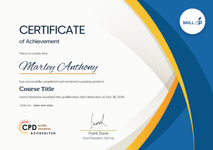Environmental Engineering & Environmental Law: Regulations and Compliance
Special Sale| CPD Accredited| FREE PDF Certificate & Transcript | Lifetime Access| Tutor Support | Free Exam
Skill Up
Summary
- Certificate of completion - Digital certificate - Free
- Certificate of completion - Hard copy certificate - £9.99
- Exam(s) / assessment(s) is included in price
- Tutor is available to students
Add to basket or enquire
Overview
Embark on a transformative journey into the world of environmental engineering and regulations with our comprehensive course. Explore the complexities of environmental pollution, wastewater treatment, air pollution, and more. Learn about sustainable practices and environmental law to catalyse positive change in preserving our planet's resources.
Learning Outcomes:
- Develop a comprehensive understanding of environmental engineering principles and their application in addressing pollution challenges.
- Gain insights into wastewater treatment and drinking water management techniques to protect water resources.
- Explore the complexities of air pollution and learn about effective mitigation strategies and control measures.
- Discover the principles of solar energy and its role in sustainable development.
- Gain a deep understanding of waste disposal, recycling, and land management practices for effective resource utilisation.
- Explore the legal frameworks and regulations governing environmental practices and develop compliance strategies.
CPD
Course media
Description
In an era where environmental issues pose significant challenges, understanding the principles of environmental engineering and compliance with regulations is crucial. Our comprehensive course, "Environmental Engineering & Environmental Law: Regulations and Compliance," provides a deep dive into the intricate world of sustainable practices and legal frameworks.
From the fundamentals of environmental engineering to the complexities of pollution control, each module offers valuable insights into key concepts and techniques. Delve into wastewater treatment, drinking water management, and air pollution control, and explore the potential of solar energy as a sustainable alternative. Gain a thorough understanding of waste disposal, recycling, and land management practices for effective resource conservation.
By exploring environmental law and regulations, you will understand the legal frameworks governing environmental practices and develop strategies for compliance. This course equips you with the knowledge and skills to tackle environmental challenges and contribute to a sustainable future.
Who is this course for?
The target audience for the course is:
- Aspiring environmental engineers seeking a strong foundation in environmental management and compliance.
- Professionals in the field of environmental engineering or sustainability looking to expand their knowledge and expertise.
- Individuals working in environmental regulatory agencies or organisations involved in environmental compliance.
- Students and researchers are interested in studying the complexities of environmental engineering and its legal aspects.
- Advocates and policymakers aiming to gain insights into sustainable practices and environmental law.
Career path
Some career paths related to this industry in the UK are:
- Environmental Engineer: £25,000 - £45,000 per annum
- Environmental Consultant: £30,000 - £55,000 per annum
- Water/Wastewater Engineer: £30,000 - £50,000 per annum
- Air Quality Specialist: £30,000 - £50,000 per annum
- Sustainability Manager: £35,000 - £65,000 per annum
- Environmental Lawyer: £40,000 - £100,000 per annum
Questions and answers
Currently there are no Q&As for this course. Be the first to ask a question.
Certificates
Certificate of completion - Digital certificate
Digital certificate - Included
Certificate of completion - Hard copy certificate
Hard copy certificate - £9.99
Inside the UK student have to pay an additional delivery fee of £10, whereas International students are required to pay an additional fee of £19.99 to receive a hard copy of the certificate delivered to their address.
Reviews
Currently there are no reviews for this course. Be the first to leave a review.
Legal information
This course is advertised on reed.co.uk by the Course Provider, whose terms and conditions apply. Purchases are made directly from the Course Provider, and as such, content and materials are supplied by the Course Provider directly. Reed is acting as agent and not reseller in relation to this course. Reed's only responsibility is to facilitate your payment for the course. It is your responsibility to review and agree to the Course Provider's terms and conditions and satisfy yourself as to the suitability of the course you intend to purchase. Reed will not have any responsibility for the content of the course and/or associated materials.



